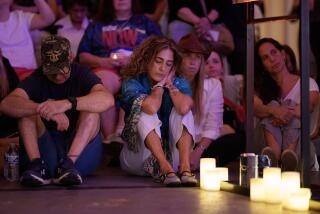Gunmen Invade S. African Vigil, Kill 14 Mourners
- Share via
ALEXANDRA, South Africa — The men with the guns came quietly before dawn Wednesday. This township of tin-scrap shacks was sleeping peacefully beneath a blanket of coal smoke and mist, and the only sound was the singing of the bereaved.
Fifty black men, women and children were gathered beneath a tent for an all-night prayer vigil to mourn a mother of three who last week became a senseless statistic in South Africa’s factional strife.
“Oliver Tambo,” they sang in homage to the leader of the African National Congress, “we are waiting for you.”
In the middle of the song, armed black men approached the tent and started shooting. Screaming mourners raced into the house next door. The attackers, fearing no one, knocked down the front door and walked through the hut, raking the three rooms with gunfire. One assailant took time to reload his AK-47.
When the shooting ended 10 minutes later, at least 14 people were dead or dying. One was an 8-month-old girl, shot in the stomach. Seventeen were injured.
And South Africa had received another in a series of gruesome reminders that even as apartheid begins to disappear and prospects of interracial peace brighten, black violence threatens this society.
“It is thuggery that is winning the day,” said Dr. Tim Wilson, after treating victims of the massacre in his Alexandra clinic.
Within hours, the usual round of finger-pointing had begun.
The ANC blamed the police for not protecting the people of Alexandra and suggested that the violence was the work of “shadowy elements” bent on destabilizing the ANC. Those forces, the ANC said, often work through its rival, the Zulu-based Inkatha Freedom Party headed by Mangosuthu Gatsha Buthelezi.
The police said they had done their best and argued, with little success, that politics did not appear to be the motive. But they added that the ANC and Inkatha should try to control their followers.
Clashes between supporters of the two groups in recent weeks have claimed more than 70 lives in Alexandra, and the township had been declared an “unrest area,” putting it, in effect, under martial law.
Archbishop Desmond M. Tutu, in an emotional address to his congregation in Cape Town, said black South Africans “must point to all the causes of violence, but ultimately we must also turn the spotlight on ourselves. We can’t go on forever blaming apartheid.
“Something has gone desperately wrong in the black community,” Tutu added.
The first sign of trouble here in Alexandra appeared about 10 p.m. Tuesday, when mourners gathered beneath a tattered brown tent in this small, impoverished township not far from Johannesburg’s most expensive homes.
Shortly after a funeral vigil began for Jane Ramokgola, 41, an ANC supporter shot to death in her home last week, a group of armed men was spotted near the tent. The police were called, but when officers arrived, the men had gone.
The police promised to increase their patrols in the area. Officers made 17 trips through the neighborhood over the next six hours, passing by the vigil for the last time at 4:10 a.m., 10 minutes before the shooting started, police said.
“We were there. We did visit,” said Maj. Ray Harrald, a police spokesman. “But people must understand. People were mourning, and we didn’t want to impose our presence.”
A thick, cool autumn mist had descended on the township, though, and Harrald admitted “it was difficult to see. We don’t deny it’s possible that people could have hidden themselves in the area.”
The men approached on foot and, when they opened fire, “we knew Inkatha was coming,” said Ncane Ntuli, a leader of the ANC-aligned Congress of South African Students. Ntuli ran outside and saw 10 men, one armed with an AK-47 and the others with pistols, machetes and knives.
“When I saw the man with the AK-47, I never thought there would be anyone living there,” said Ntuli, 20. “That person was prepared to kill everyone.”
Ntuli and other mourners fled into the Ramokgola house next to the tent, hiding behind sofas and under beds. But the attackers pursued them into the dwelling, shouting, in Zulu, “We want men. Stand up! We don’t want girls. Only men.” After several bursts of gunfire, they waded into the rooms, swinging the knives and machetes.
A woman next to Ntuli was shot and fell on him, knocking him to the floor, where he stayed, her body on top of him. He closed his eyes, pretending to be dead.
“I don’t even know her name,” he said, tears welling in his eyes.
After the men left, moans filled the small house. Ten members of the grieving family and four others were dead or mortally wounded.
Ntuli called the police, but nearly an hour passed before officers arrived. He helped some of the injured to the clinic two blocks away. Then, as dawn broke, he walked the rocky streets of Alexandra, visiting the sobbing families of his dead friends. And he prepared for more funerals.
More to Read
Sign up for Essential California
The most important California stories and recommendations in your inbox every morning.
You may occasionally receive promotional content from the Los Angeles Times.














